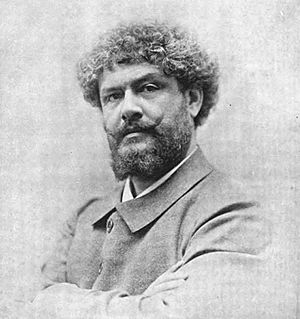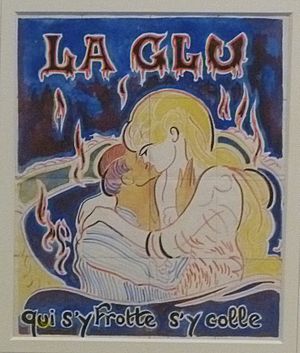Jean Richepin facts for kids
Quick facts for kids
Jean Richepin
|
|
|---|---|
 |
|
| Born | 4 February 1849 Médéa, French Algeria |
| Died | 12 December 1926 (aged 77) Paris, France |
| Occupation | Poet, novelist and dramatist |
| Signature | |
Jean Richepin (born February 4, 1849 – died December 12, 1926) was a famous French writer. He was known for his poems, novels, and plays. Richepin was born in Médéa, which was part of French Algeria at the time. He later became a member of the prestigious Académie Française, a group that protects the French language.
Contents
Early Life and Career Beginnings
Jean Richepin was born in 1849. His father was a doctor in the army. Jean went to a good school called the École Normale Supérieure. He was very smart but also quite wild and free-spirited.
He used his energy in many ways. He was a volunteer soldier in the Franco-German War. He also worked as an actor, a sailor, and even a stevedore (someone who loads and unloads ships). All these experiences helped him write.
Richepin started writing poems, plays, and novels. These works showed his unique and strong talent. In 1873, one of his plays, L'Étoile, was performed. He wrote it with André Gill.
Becoming a Well-Known Writer
Jean Richepin became widely known in 1876. This was when he published a book of poems called La Chanson des gueux (The Song of the Beggars). His writing was very direct and open. It challenged common ideas of the time. Because of this, he faced legal trouble and was briefly put in prison. He also had to pay a fine.
His later poetry books also had this bold style. Some of them include Les Caresses (1877), Les Blasphèmes (1884), and La Mer (1886). He continued to write many more volumes of verse throughout his life.
Novels and Their Evolution
Richepin also wrote many novels. His early novels, like Les morts bizarres (1876) and La Glu (1881), were often dark and intense. Over time, his writing style changed.
He began to explore characters' thoughts and feelings more deeply. Examples of these novels include Madame André (1878) and Sophie Monnier (1884). He also wrote simpler stories about everyday life. These include Miarka (1883) and Les Braves Gens (1886).
Plays and Opera Adaptations
Jean Richepin's plays are often considered some of his best work. Many of them were performed at the famous Comédie française theater. Sometimes, his plays had very strong language and dramatic scenes. This was part of his unique writing style.
Richepin also worked on operas. He adapted his own novel, Miarka la fille à l'ours, into an opera called Miarka (1905). This opera had music by Alexandre Georges. He also wrote the story for Jules Massenet's opera Le mage (1891).
He was a friend of the composer Emmanuel Chabrier. Richepin helped Chabrier fix the story for his opera Le roi malgré lui. He also wrote the words for Chabrier's concert piece La Sulamite. His novel La Glu was even turned into two other operas.
Connections and Later Life
Jean Richepin was friends with other important artists. He was a friend of the famous poet Arthur Rimbaud. Richepin was one of only a few people to receive the very first edition of Rimbaud's book, A Season in Hell.
In 1913, Richepin attended a special dinner in London. It was for a group called the Ligue des Gourmands. He was a co-president of this group with the famous chef August Escoffier.
Jean Richepin passed away in Paris on December 12, 1926. His son, Jacques Richepin, also became a playwright.
See also
 In Spanish: Jean Richepin para niños
In Spanish: Jean Richepin para niños


